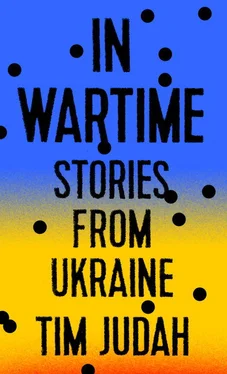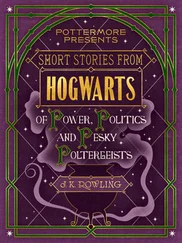Negotiating with the IMF and Ukraine’s debtors was one thing, but trying to get the system under her to work was quite another. Well, “that is twenty-three years of problems which have mounted up,” I ventured to suggest. “No,” she snapped, “it’s a hundred years of crap!” We were on to the subject of why it is so hard to reform. The Soviet-inherited system was designed, she said, so that the person at the top got to shoulder all the responsibility, so that absolutely no one lower down had to take any. Every day she is given files, which can contain literally thousands of documents, and she has to affix her signature to each file. But the civil servants are the ones who know what is in the files she is being asked to sign off on, and thus “they are in control.” The civil servants have been taught to check if anything that comes before them has a consequence for the budget, and if it is legal, but not how to solve problems. For example, when long-overdue laws concerning judicial reform came up, her ministry simply advised her to tell the president to veto them, because they foresee paying judges more in order that they may be less tempted to accept bribes. She refused and told them that their job was not to just say “no” but to “figure how we could do it.”
Likewise, when duty was raised on beer, an uncontroversial measure, she signed on the dotted line and had been bogged down ever since trying to sort out the mess. To raise the tax, for an unknown reason the civil servants reclassified beer as a spirit like vodka, which instantly made most advertising illegal. “I had the prime minister of Denmark on the phone,” she sighed.
A big part of the problem, she said, was that while the removal of subsidies was going to make gas and heating bills far more expensive for most people now, reforms will take years to affect people’s lives for the better. It was part of her job to come up with ideas which could make things better now, before people concluded that nothing was being done.
On the plus side she believed that Ukraine had never been a more tolerant place. With irritation in her voice she recalled meeting the finance minister from an EU country—“I won’t say which one!”—who told her he wanted to talk about Ukraine’s “discrimination” against Russian-speakers. Turning to her colleague from the central bank, she asked her to tell him what the working language of the bank was. “Russian.” In her office, Russian, English and Ukrainian are used interchangeably and the prime minister employed all three languages “in one sentence.” At last, she said, “the definition of being a Ukrainian is being a member of this society and not being ethnically Ukrainian.” And this, having grown up as an American, is something she was very happy to see.
As she poured a final glass of wine, she said her task was actually quite simple. It was to “steer us out of this hole.” If she could do that, then the exhilaration—and exhaustion—of this period of her life would all have been worth it. Out of the gathering gloom, Lady, the spaniel, came snuffling about hoping for tidbits. Her reputation was all she had, said Natalie, and so far no one had come to her office looking for similar easy pickings. Lady got nothing.
During the parliamentary election campaign of October 2012 I met Leonid Kozhara, the urbane spokesman of Viktor Yanukovych’s Party of Regions. At this point Yanukovych and his party were saying that there was no dilemma: they were on the path to Europe, away from Ukraine’s traditional subservience to Russia. During our lunch Leonid tugged the sleeve of his jacket. For Russia, he said dismissively, the other former Soviet republics were just like its buttons, but “ we ,” meaning Ukraine, “ are the sleeve .” The man who would be Yanukovych’s foreign minister in the next, doomed government, went on to tell a story to explain why Ukraine did not want to join Russia, Kazakhstan and Belarus in Putin’s Customs Union, which was officially due to become the Eurasian Union on January 1, 2015. Some colleagues from Kazakhstan had told him a cautionary tale. They said that in a meeting to discuss plans over a certain issue, the Russians had explained what they wanted to do. When the Kazakhs began to put forward their ideas, the Russians told them they were not interested because they had just explained to them what would be done, whether they liked it or not.
In the Verkhovna Rada, I met Yurii Miroshnychenko, Yanukovych’s representative to Parliament, who said: “We are fully aware of the price we will have to pay for this decision, yet we are ready to make this decision as a strategic one.” In retrospect it seems hard to imagine that a party so firmly based in the east, as the Party of Regions was, was then so determined to take the country westward.
This chapter ended, however, when Yanukovych, after pressure from Vladimir Putin, announced he was not signing the EU deals, sparking off the Maidan revolution. As it began I met Stefan Fule, then the EU’s enlargement commissioner in Brussels. A Czech, he was one of the last generation of eastern European politicians and diplomats to have studied in Moscow, so he knew the Russians very well and understood that Putin was set on re-creating a circle of countries around Russia which would bend to its will. In a bustling Brussels bistro he told me that for Russia, Ukraine had always been part of a geostrategic game but that the EU had struggled to decide to what extent it should play geostrategy too, as opposed to relying solely “on our values and principles.” The Russian tactic was “bullying, bullying, bullying and being brutal,” but “our mistake is only ever having been half serious about the transformation of that part of Europe and not clearly offering them membership in the long run.”
In Odessa, just before the revolution I met Hanna Shelest, then a thirty-three-year-old researcher at the National Institute for Strategic Studies. We talked about how many people were ambivalent about the proposed EU deals because they simply did not understand what they meant. Ukrainian media funded from Russian sources had, she said, given people the impression that if Ukraine chose Russia over the EU, “then everything will be cheaper, such as gas, and that if we go toward the EU normal marriages will not exist, only gay marriages.” Russia was presenting itself as “the big brother who will tell us what to do,” and a pro-Russian choice would mean that “we will live happily ever after and won’t have to read that complicated EU agreement.” As we ate pizza her friend Irina Yakovleva, aged twenty-nine, then a journalist, said many of her friends thought that Ukraine’s own politicians had “spoiled everything” and were “not real leaders.” Some of those friends who leaned toward Russia were not so much “pro-Russian” but said they liked Putin “because he is a leader… Even in the EU there are no big figures. They say: ‘I like that guy, that is why I support him.’”
A year after the beginning of the war all this talk felt as though it had taken place much, much longer ago. But now a new phase was beginning. Novorossiya, whose ideologues had dreamed they would take all of Ukraine’s Black Sea coast and most of its south and southeast, remained penned into relatively small, albeit before the war economically important, areas. Mariupol on the coast had not fallen, and Crimea remained without a land connection to Russia. The two Minsk cease-fires foresaw some form of autonomy and reintegration of the eastern territories into Ukraine, but none of this appeared very realistic. When I met Fule he said that given the way Putin had begun fighting for Ukraine—and this was before Crimea was stripped from Ukraine and a single shot fired in the east—he seemed “like a dog with its teeth clamped into a man’s neck.” A year later it seemed rather that the dog had its teeth clamped onto Ukraine’s leg. Ukraine could not shake its bleeding leg free, but the dog, unable to do more harm, still would not let go.
Читать дальше












